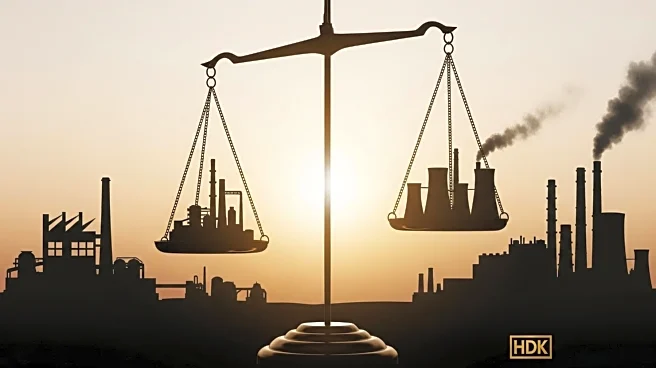What is the story about?
What's Happening?
The National Energy Regulator of South Africa (Nersa) has approved ArcelorMittal South Africa's (AMSA) applications for negotiated pricing agreements (NPAs) for its Newcastle and Vanderbijlpark operations, despite Eskom's initial rejection. Nersa's decision allows AMSA to negotiate lower tariffs with Eskom, although Eskom had previously argued that AMSA's applications did not meet the criteria outlined in the government's NPA framework. The approval comes amid growing pressure on South Africa's industrial capacity and AMSA's recent operational challenges, including placing its Newcastle furnace into care and maintenance.
Why It's Important?
Nersa's approval of AMSA's applications is significant as it may set a precedent for other industrial companies seeking similar tariff relief. This could lead to increased subsidies, impacting Eskom's financial stability and standard tariff customers. The decision also highlights the ongoing challenges faced by South Africa's industrial sector, which is struggling to remain competitive amid high electricity costs. AMSA's ability to negotiate lower tariffs could provide temporary relief, but broader policy or funding support may be necessary to sustain its operations and prevent potential retrenchments.
What's Next?
Following Nersa's approval, AMSA is expected to approach Eskom to negotiate favorable tariffs. Eskom may wait for Nersa's reasons for decision before deciding whether to challenge the approval. The outcome of these negotiations could influence future applications for NPAs by other companies, potentially leading to further disputes. Additionally, discussions with the government on reopening AMSA's Newcastle mill and sustaining its long products business are likely to continue, with potential implications for the company's future operations and ownership.
Beyond the Headlines
The situation underscores the complex interplay between regulatory decisions, industrial competitiveness, and energy policy in South Africa. It raises questions about the sustainability of current subsidy models and the need for comprehensive energy reforms to support industrial growth. The potential retrenchments in the ferrochrome sector and AMSA's operational challenges highlight the broader economic pressures facing the country, necessitating strategic interventions to bolster industrial capacity and employment.















